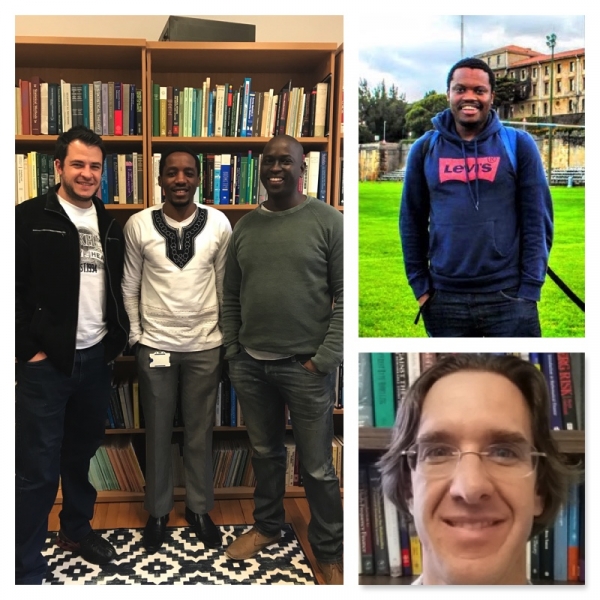The Department of Statistical Sciences is excited to welcome new staff in July 2017 and looks forward to the new energy that they will bring.

(Left: Etienne Pienaar, William Msemburi, Mzabalazo Ngwenya; top right: Melusi Mavuso; bottom right: Tim Gebbie)
Etienne Pienaar has lived in Johannesburg for most of his life, and enjoys hanging out with friends and his girlfriend, running with his jogging buddy, Watson, (a Labrador of roughly equal intelligence to the Sherlock Holmes character from whom he was named), making music, and occasionally spending me in the engine bay of a broken BMW - fortunately, not his own. He obtained a BSc in Financial Mathematics at the University of Johannesburg and subsequently completed a Postgraduate Diploma in Actuarial Science and an Honours in Statistics at UCT. He then enrolled for a Master’s and then a PhD in Statistics. Although his research focuses primarily on the analysis of non-linear jump diffusion processes and the development of computationally scientific techniques (and accompanying software packages) to do so, he has strong interests in machine learning and risk valuation for financial instruments.
William Msemburi: Having obtained Statistics BSc and BSc (Honours) degrees and an MPhil Demography, all at the University of Cape Town, I consider UCT to be a second home. Since my graduation I have worked for the Medical Research Council developing methods for quantifying South Africa’s disease burden and have been a Biostatistician at UCT health sciences assisting faculty and students to perform their research using the appropriate statistical methods and assumptions. My education, work and research have developed in me a real passion to use statistics to better people’s lives. Beyond this I envision a career equipping generations of African statisticians, demographers and data analysts with the quantitative expertise necessary to make an impact on the global stage. At the moment I am completing a PhD in Global Health Metrics through the University of Washington with a focus on using hierarchical models within a Bayesian framework to estimate district level health. Concurrently I am developing some data visualization applications to make the statistics and the science behind my research accessible to more people.
Mzabalazo Ngwenya: I have always had a passion for numbers and the environment. Following this passion I studied Statistics and Geography, Environmental Science & Planning (GEP) for my undergraduate degree at the University of Swaziland (UNISWA). I majored in these subjects until 4th year to obtain a double major degree with distinction in 2005. In 2006 I moved to Cape Town to purse postgraduate studies. Here I completed an MSc in Mathematical Statistics at the University of Cape Town (UCT) in the Department of Statistical Sciences. My masters research focused on kriging a statistical technique widely used in the earth and environmental sciences. During these studies I was very active in the department working as a tutor and a statistical consultant for the department’s consulting service on an ad-hoc basis. After obtaining my postgraduate degree, with distinction, I moved to the Agricultural Research Council (ARC) in Stellenbosch where I worked as a Biometrician. I was in the employ of the ARC for 6 years from 2011 till early 2017 before returning to UCT as a Lecturer in Statistical Sciences.
Melusi Mavuso: I grew up in Mbabane, Swaziland and completed both my primary and high school there. I came to UCT in 2008 to study a BSc degree, majoring in Mathematics, Statistics, and Actuarial Science and proceeded to do my honours in Mathematics. I then completed a Masters degree in Mathematical Finance and another one in Pure Mathematics, while lecturing in the Statistics department. I am primarily interested in the applications of mathematical techniques to the hedging of financial instruments in incomplete markets. My other areas of interest include The Calculus of Variations, Probability Theory, and Machine Learning.
Tim Gebbie: I was born in Cape Town, grew up in Johannesburg where I studied Physics and Applied Mathematics at WITS. I completed my PhD at UCT in Cosmology where I worked on the link between theory and data as related to the concordance model. This before the actual availability of large high precision data sets (such as those provided by the Planck satellite). At that time, mathematical physics was at its nadir and calibration, statistical and modelling issues were only just emerging as key domains. I moved into quantitative finance after my graduate studies to spend more than 10 year’s working in data-intensive areas of quantitative and computational finance. First in the space of quantitative asset management were I applied various statistical learning techniques to bond, derivative and equity market portfolio control problems. Then in quantitative trading and algorithmic trading where I developed and traded various machine learning based strategies; both on the JSE and LSE. These areas have now matured to span the interdisciplinary domain of data-science, specifically data-science in high-frequency finance; a domain at the interface between statistics, statistical and machine learning, computation and data-intensive science and technology. My particular research interests relate to data driven investigations of market microstructure and market ecology – the study of the relationship and interdependencies of various agents and actors in financial markets at trade event time-scales. The application of the research relates to the automation of portfolio control; both for investing and trading. This requires the knowledge and exploration of various statistical learning and machine learning techniques as applied to large and fast financial data-sets.
